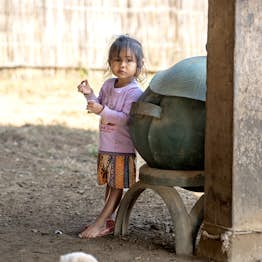The year 2024 saw the continuation of the programmes in the fifth Indicative Cooperation Programme (ICP V), which covers the 2023 – 2027 period. With a funding envelope of €95 million, ICP V has expanded its activities to three additional provinces – Champasak, Savannakhet and Luang Prabang – by incorporating the skills development programme. Interventions remain focused on four priority provinces — Bokeo, Bolikhamxay, Khammouane and Vientiane — where efforts target health and nutrition, integrated local development, the development of skills for tourism, agriculture and forestry (STAF), and the promotion of the rule of law, access to justice and good governance.
During Minister Bettel’s visit in February 2024, an additional €3 million was allocated to the health and legal education sectors, underlining the continued importance attached by Luxembourg to those areas. In addition, Luxembourg plays a leading role in the Team Europe Strategy in Laos.
Through its health and nutrition programme, Luxembourg continues to support basic and high-quality health services, with a particular focus on maternal and child health as well as combating malnutrition. In 2024, the budget increase formalised on 8 February enabled essential equipment such as medical refrigerators to be provided to the Lao Red Cross to improve blood product storage. Collaboration between Mongolia and Laos in the field of cardiology has also been reinforced. This collaboration seeks to improve cardiology services in Laos through South-South cooperation efforts. Having benefited from Luxembourg’s support for the development of its cardiac services since the early 2000s, Mongolia is now sharing its expertise and resources to help build local cardiology capacity in Laos.
The local development programme has carried out development plans in 226 villages. Despite the challenges, the programme has also adapted its scope to include disaster risk reduction, which was previously managed by Fondation Caritas Luxembourg. After a case of embezzlement involving the latter, responsibility for disaster risk reduction was permanently transferred to the health programme within ICP V, ensuring the project’s continuity.
In the area of skills development, the STAF programme now covers tourism and hospitality training nationwide, with model hospitality schools in Vang Vieng and Luang Prabang, and a third opening soon in Champasak. In 2024, agreements were signed with ten public institutions to train up to 1,000 students from disadvantaged backgrounds. In addition, in late 2024 the STAF programme was selected as a flagship project under the European Union’s Global Gateway initiative in Laos.
The programme promoting the rule of law made progress through the implementation of workshops on human rights education and curriculum development, with plans for a broader rollout in 2025. Since 2024, the University of Luxembourg’s commitment to the promotion of the rule of law in Laos has been fully integrated into the programme for the promotion of the rule of law, access to justice and good governance, under the management of the Luxembourg development cooperation agency. This integration consolidates efforts and resources to maximise the impact of research projects and scholarship programmes relating to higher legal education.
In addition, Luxembourg’s bilateral cooperation has also ramped up support for strategic initiatives such as the Laos-Luxembourg statistical cooperation project (LLPS) and the PaReCIDS project. The LLPS project, which focuses on statistical capacity-building, aims to improve the quality and availability of social and environmental statistical data that are essential for development planning. In parallel, the PaReCIDS project, in collaboration with the Pasteur Institute of Laos and the Luxembourg Institute of Health, focuses on infectious disease surveillance and research, thus strengthening local capacities to respond to health emergencies.
A notable example of effective collaboration is the joint engagement between the European Union, Switzerland and Luxembourg under ICP V, where significant funds are delegated to LuxDev for the implementation of targeted programmes. These multilateral projects complement bilateral initiatives and focus mainly on key sectors such as health, education and agricultural development. One of the most significant of these programmes is the United Nations Joint Programme (UNJP) on reproductive, maternal, newborn, child and adolescent health. That programme is implemented in collaboration with renowned agencies such as the WHO, UNFPA and UNICEF. In addition, sustained efforts to clear unexploded landmines left over from the second Indochina War are also being funded, with a budget of €1 million allocated for the 2022 – 2024 period.
Development of PDA
Reference data
- Population (millions): 7,66
- GNI (per resident): 9170
- Human Development Index (HDI): 139/193
- Life expectancy: 69
